Review- Hulk Visionaries: Peter David, Vol. 1
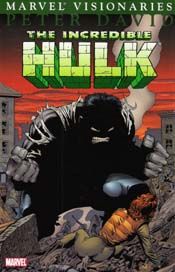 Hulk Visionaries: Peter David, Vol. 1
Hulk Visionaries: Peter David, Vol. 1By Peter David, Todd McFarlane, and John Ridgway
Published by Marvel; $19.99 US
Collects The Incredible Hulk #331-#339
I was not happy with Mr. David. Oh no, I was not happy with him at all.
I was around 10 or 11 when Peter David started his twelve-year run on The Incredible Hulk, and as happy as I was with his dispatch of the ill-conceived Rick-Jones-Hulk in his second issue, well. What can I say? I had just barely nudged myself into pre-adolescence, and it was the freakin’ Hulk. Don’t get me wrong, I didn’t care that he was gray or smart or could only lift a large hill rather than a small mountain, but. Well.
In his third issue he fought a cop.
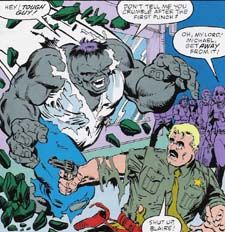 A cop. One cop. As in singular. As in less than 82 cops. As in not the Abomination or the Rhino or Thor or anyone else who could likewise lift large hills or small mountains.
A cop. One cop. As in singular. As in less than 82 cops. As in not the Abomination or the Rhino or Thor or anyone else who could likewise lift large hills or small mountains.The adversaries that followed included a Kate-Moss-sized gamma zombie, a similarly sized supernatural killer who dressed like a reject from The Crucible, an alien chick, and a kid not much older than I was at the time. He fought three-fifths of the original X-Factor somewhere in there, a scenario that gave me at least some hope of a respectable Hulk-smashing, that is until they kicked his ass.
Dammit.
I would re-read those issues with the same kind of juvenile masochism that might urge me to watch Caddyshack 2, just so I could sit and bitch about how utterly bad they were. During these re-readings, something funny happened. I realized that, in spite of the relative lack of earth-shattering fisticuffs, I liked the stories.
Peter David was the first writer to make me realize that comics could be more than flashy costumes and seizure-inducing battles. In fact, he was the first writer to make me realize that comic books were written. I literally had never before been interested enough in the writing craft of the medium to bother to turn to the title pages to check who had scripted the issues. It just never occurred to me. I was too busy counting the number of pebbles that jumped off Ben Grimm’s head every time my green guy knocked him into orbit.
The first nine issues of David’s run are collected in Hulk Visionaries: Peter David, Vol. 1, and re-reading them now it’s strangely satisfying to note the relatively quiet beginnings of what would later become some of the hallmarks of David’s work on the title.
David’s interpretation of Betty Banner, for example, starkly contrasts her previous portrayals. She’s far from the G.I. Jane who’d follow her husband to different worlds and level uzis at the heads of gods later during David’s tenure, and still little more than an appendage to the Hulk’s paler half, but as soon as the first few pages of the collection, we see a Betty Banner stronger than she'd been in years. If you don’t believe me, go through some of the Milgrom issues (Al Milgrom wrote the title right before David), and you just COUNT how many of Betty’s lines start with "Oh, Bruce!", usually accompanied with tears, a faint, a swoon, or all of the above.
David’s pension for diving headfirst into political hot topics is evident here as well, most notably in his exploration of domestic violence in the third chapter, "Quality of Life" (the aforementioned Hulk vs. only-one-cop issue).
Though -- contrary to popular belief -- it wasn’t David who first introduced the idea that the Hulk’s creation was just as connected to his childhood trauma as it was to radiation, it was David who made the concept an absolutely inseparable part of the character’s evolution. The beginnings of one of David’s most controversial interpretations -- that Banner not only was a victim of radiation, but suffered from Multiple Personality Disorder -- is most blatant in "Native Son," the final chapter of the trade, where he references the abuse Banner suffered during his childhood. Though, really you can see it as soon as the first chapter. As early as the second page of the first story, Banner suggests he should jumpstart his transformation into the gray Hulk in order to go after the (soon to be de-Hulkified) Rick-Jones-Hulk. When Betty tears him a new bunghole for the suggestion, he says, "I’m sorry Betty. Of course. You’re absolutely right. I don’t know what possessed me." Throughout the collection, the notion that Banner is a bit more "Hulk" than he’d like to admit, and vice-versa, is a simple yet powerful extension of the concept heralded at the end of Bill Mantlo’s run (and, to a lesser extent, Roger Stern’s): that Bruce Banner’s connection to the Hulk runs deeper than DNA.
It’s interesting to watch McFarlane try to find his footing in the beginning of his work on the title. In the beginning, Hulk's physical presence is muddy and ill-defined, and the first few issues feature numerous panel-for-panel swipes from John Byrne’s first Hulk run, particularly during battle scenes.

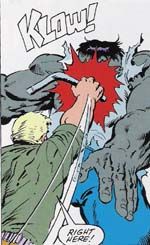
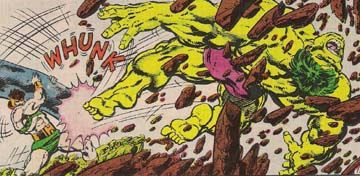
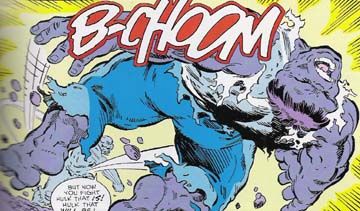
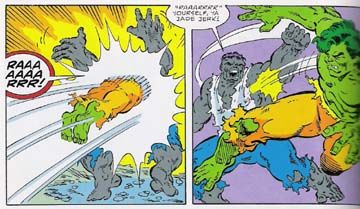
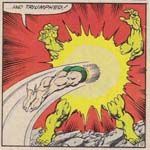

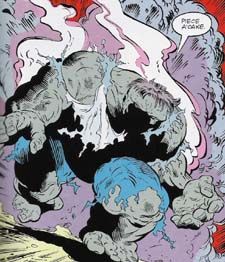 It isn’t until the last few chapters that we see McFarlane settle on the Hulk that defined his tenure on the book - the jutting forehead; elephantine skin; and the dark, unreal mass that often suggested fat more than muscle.
It isn’t until the last few chapters that we see McFarlane settle on the Hulk that defined his tenure on the book - the jutting forehead; elephantine skin; and the dark, unreal mass that often suggested fat more than muscle. The only penciler featured besides McFarlane is John Ridgway in the classic "The Evil That Men Do!" which survives as perhaps the single scariest Hulk story ever told.
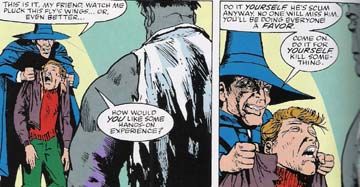
Other highlights include the aforementioned "Quality of Life" and "Native Son," the latter of which ends the trade with a line of dialogue that even today can tear me up just a little bit (and no, I won’t reproduce it here, because you need to read it yourself).
With Peter David and the Powers That Be at Marvel enjoying a relationship that feels more like England/America circa 2006, as opposed to the England/America circa 1776 atmosphere of the Captain Marvel days, and David winning an exclusive contract with Marvel and more A-list assignments like Friendly Neighborhood Spider-Man, hopefully more fans will get curious enough about his early work on Hulk to keep these volumes coming. As much as I'd love to see it, I have a difficult time believing his entire run could be collected. If we can just get to end of the David/Keown run I'll be happy. At the time of this post, Volumes 2 and 3 have been released and Volume 4 is on its way. According to the Amazon solicitation for Volume 4, it will reprint Hulk #355-#363, leaving over 100 issues to PAD's run, even if they don't reprint any more guest appearances (and Volume 3 reprinted stories from Web of Spider-Man and Fantastic Four). That's at least 11 or 12 volumes to go. Probably more.
Print it, Marvel, and I'll buy it.
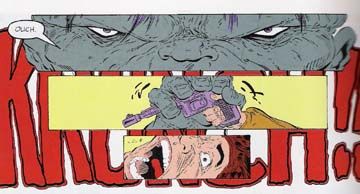


4 Comments:
It's amazing what you'll find searching for a few McFarlane hulk illustrations. That was such an interesting comparison between the early McFarlane hulk frames and the Byrne frames! Thanks for the great blog!
we gonna celebrate the green day, yeah the day that Bruce Banner become the incredible hulk, this character had many fights with other marvel heroes.
Personally I hater Hulk, but by the simple reason I always have thought the story of this character has not enough sense, don't you think??
This is one of my favourite characters. When all is said in done the heroes are the best.
Post a Comment
<< Home